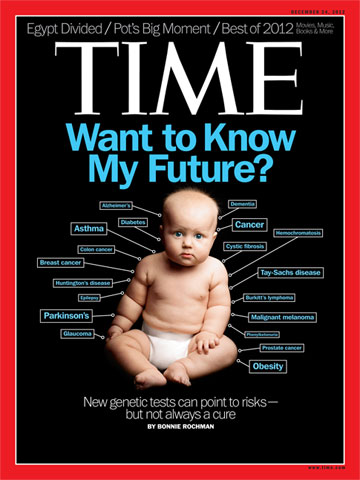
(4 of 6)
Genome sequencing isn't the first medical development that has forced doctors to grapple with the question of how much to tell patients. There have been cases of physicians' choosing to keep quiet when a test revealed a child's father was not his or her biological father. In years past, doctors have agreed not to share news of a terminal illness with an elderly patient if the consensus was that the knowledge would cause too much anxiety.
But genomes are vastly more complicated. "If you fall off your bike and get an X-ray looking for a fractured rib, the radiologist scans the entire X-ray and automatically reports back to your doctor if something else is going on," says Dr. Robert Green, a geneticist at Harvard Medical School. "More than a few cancers have been picked up this way. The problem with genomics is that everyone could have incidental findings."
Perhaps nowhere is the risk of overreacting to murky results greater than in the field of prenatal testing. This year two groups of researchers announced that they had each sequenced a fetus' DNA from cells gathered from the mother's blood, leading to concerns that in the not-too-distant future, women might abort a pregnancy if they learn their unborn baby has an increased risk for cancer. "Great, we can sequence the genome of a fetus. What the hell does it tell us?" says bioethicist Tom Murray, a visiting scholar at Yale. "Much less than most people probably believe. Probabilities are not the same as guarantees."
Faced with a growing need for protocols, the medical community is trying to hammer out some guidelines. This spring, the American College of Obstetricians and Gynecologists stated that though personalized gene profiles may be promising, they are "not ready for prime time" and should be discouraged. The American Academy of Pediatrics advises against genetic testing for children unless there is clear evidence of beneficial treatment or effective prevention strategies.
The challenge doctors face in determining how much to tell patients--or their parents--is complicated by a steady stream of new discoveries. Test results that are indecipherable today could be lifesaving in 2025. But waiting years to share sequencing information is a logistical nightmare, particularly considering that patients may not remain under that geneticist's care and may change addresses many times over. Genomic transcripts are also so massive--labs typically FedEx a hard drive because there's too much data to transmit digitally--that the information is often relegated to a hospital's archives, if it's saved at all.
One possible solution to the problem of what to do with the deluge of data is a new Web-based venture called My46. Named for the number of chromosomes in human DNA, the nonprofit will allow people to store their sequencing results online and choose what they want to know and when. For example, parents of a baby who gets sequenced could opt to learn right away any findings about childhood diseases and put everything else--from unclear results to increased risks of adult-onset diseases--in the digital equivalent of a locked drawer, where it can be stored forever and accessed whenever they want to open it.
